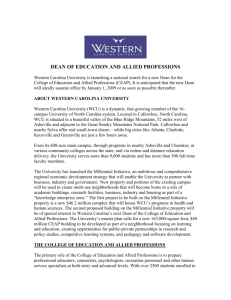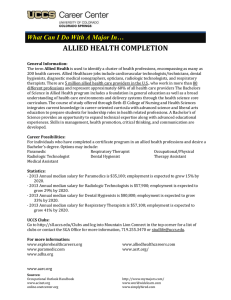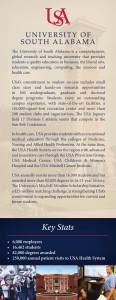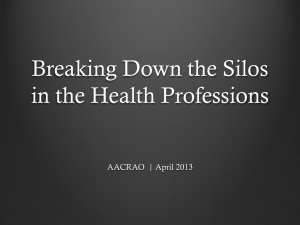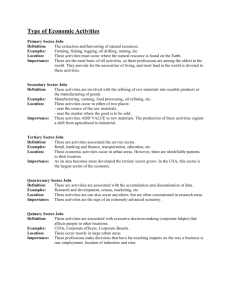COLLEGE OF ALLIED HEALTH PROFESSIONS UNIVERSITY OF SOUTH ALABAMA
advertisement
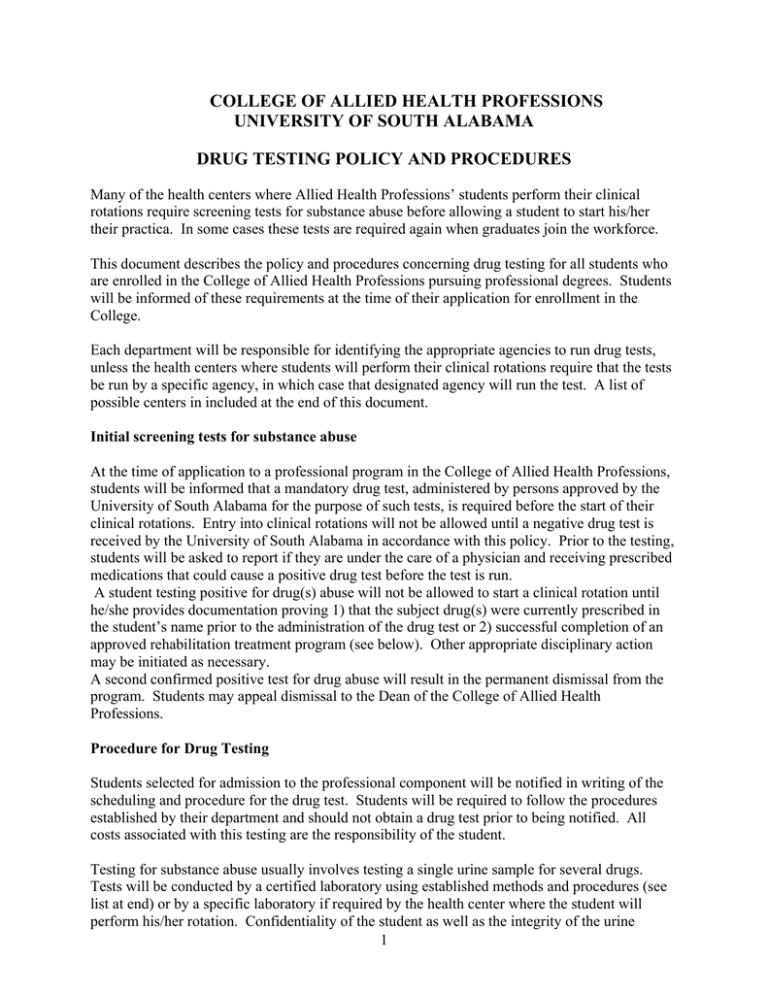
COLLEGE OF ALLIED HEALTH PROFESSIONS UNIVERSITY OF SOUTH ALABAMA DRUG TESTING POLICY AND PROCEDURES Many of the health centers where Allied Health Professions’ students perform their clinical rotations require screening tests for substance abuse before allowing a student to start his/her their practica. In some cases these tests are required again when graduates join the workforce. This document describes the policy and procedures concerning drug testing for all students who are enrolled in the College of Allied Health Professions pursuing professional degrees. Students will be informed of these requirements at the time of their application for enrollment in the College. Each department will be responsible for identifying the appropriate agencies to run drug tests, unless the health centers where students will perform their clinical rotations require that the tests be run by a specific agency, in which case that designated agency will run the test. A list of possible centers in included at the end of this document. Initial screening tests for substance abuse At the time of application to a professional program in the College of Allied Health Professions, students will be informed that a mandatory drug test, administered by persons approved by the University of South Alabama for the purpose of such tests, is required before the start of their clinical rotations. Entry into clinical rotations will not be allowed until a negative drug test is received by the University of South Alabama in accordance with this policy. Prior to the testing, students will be asked to report if they are under the care of a physician and receiving prescribed medications that could cause a positive drug test before the test is run. A student testing positive for drug(s) abuse will not be allowed to start a clinical rotation until he/she provides documentation proving 1) that the subject drug(s) were currently prescribed in the student’s name prior to the administration of the drug test or 2) successful completion of an approved rehabilitation treatment program (see below). Other appropriate disciplinary action may be initiated as necessary. A second confirmed positive test for drug abuse will result in the permanent dismissal from the program. Students may appeal dismissal to the Dean of the College of Allied Health Professions. Procedure for Drug Testing Students selected for admission to the professional component will be notified in writing of the scheduling and procedure for the drug test. Students will be required to follow the procedures established by their department and should not obtain a drug test prior to being notified. All costs associated with this testing are the responsibility of the student. Testing for substance abuse usually involves testing a single urine sample for several drugs. Tests will be conducted by a certified laboratory using established methods and procedures (see list at end) or by a specific laboratory if required by the health center where the student will perform his/her rotation. Confidentiality of the student as well as the integrity of the urine 1 sample will be protected. The procedure for collection, as determined by the testing site, will involve stringent measures to guard against specimen exchange or alteration, tamper-proof urine specimen containers, and chain of custody procedures that identify all individuals involved in specimen collection, transfer and testing. A drug test will be presumed positive if any of the commonly abused drugs are detected. Some commonly abused drugs are listed at the end of this document (see addenda) For presumed positives, the student may request that the remaining urine sample be sent to another testing laboratory for confirmation at additional cost to the student. If the results from the urine test are positive, the available evidence, including health history, will be used to determine the presence or absence of drug use. The testing laboratory will report the results of the initial urine screen to the student’s departmental chairperson. The department chairperson will ensure confidentiality of results by making the information available only to the student and appropriate College of Allied Health Professions Administrators. The records will be kept in a locked cabinet in the College of Allied Health Professions’ Dean’s office. Drug/Alcohol Testing during the Professional Program During their clinical rotations, students will be subjected to the same rules and regulations that apply to all employees at the clinical site. In addition to those that may be required at the clinical site, additional drug/alcohol testing for any student enrolled in the professional component can be requested at any time by a faculty member, a clinical supervisor or an administrator in the College of Allied Health Professions under the following circumstances: 1) If there is reasonable cause to suspect that the student is impaired, in violation of the University policy to maintain a drug-free environment, 2) if the student is involved in a class-related accident or incident which could have endangered the health or safety of another person or one’s self, or 3) if the student is included in a random testing to ensure compliance by students with this policy. If the request is made by a supervisor in the clinical site, the supervisor should follow the same rules that apply to other employees in that facility. Faculty members should request a test after consultation with the chairperson or with a colleague who could confirm this behavior. The cost of this additional drug testing will be borne by the College of Allied Health Professions. The drug testing procedure as described in the above section (Procedure for Drug Testing) will be followed. A student who is tested because he/she appears to be impaired will not be allowed to continue in professional classes/clinical rotations and will be placed on suspension from same until the test results are received. A student with positive drug test results will be withdrawn from the professional program and encouraged to seek evaluation and treatment at a recognized substance abuse treatment center. Refusal by a student to submit to testing will result in that student’s dismissal from the professional component of the College of Allied Health Professions. Any student, who voluntarily admits to having a chemical dependency problem, will be referred to an appropriate substance abuse agency for counseling. Conditions, if any, for continued participation in the program will be at the discretion of the chairperson. A student readmitted to the program after rehabilitation will submit to drug tests as requested by the College of Allied Health Professions and will be dismissed if any test after readmission is positive. Faculty procedures concerning reporting possible cases of substance abuse by students The College of Allied Health Professions maintains a drug-free environment. Any student who demonstrates behavioral changes suspected to be related to the use of drugs or alcohol may be 2 subjected to testing at the discretion of the College administration. The decision to refer a student for drug testing will be based on, but not limited to: Observable phenomena such as direct observation of drug/alcohol use, physical symptoms and/or manifestations of being under the influence of a drug/alcohol. Erratic behavior, slurred speech, staggered gait, flushed face, dilated/pinpoint pupils, wide mood swings, sleeping and/or deterioration of work performance. Information that a student has caused or contributed to an accident that resulted in injury to him/herself or others, requiring treatment by a licensed health care professional. Conviction by a court of a charge related to drug, alcohol or controlled substance offenses. Testing will be conducted using the following policy/procedure: • An academic or clinical faculty member will ask another faculty member or licensed health care professional to confirm the suspicious behavior as a “witness”. If a preceptor or other designated instructor reports behavioral changes, the faculty will ask the preceptor to have another licensed health care professional confirm the behavior. • If the incident occurs on campus, Security may be called in to help in dealing with the student, if he/she appears agitated or violent. The Security officer may serve as a witness of impairment. • Students will be subjected to the same procedures applicable to employees in the site where they are doing their clinical rotations. All expenses associated with this test will be covered by the College of Allied Health Professions. • If the clinical site does not have drug testing policy, the student will be asked to leave the area and go with a faculty member or supervisor and a witness (as defined above) to discuss the situation in private. The discussion will be documented, and the decision to refer for drug testing will be made. In the case of a practicum situation, faculty may visit the site or confer by phone with the student. A witness should be included in the phone conference. • If the decision is to refer the student for drug testing, the student should be instructed on where and when to report for testing: A. Provide the student with a list of collection sites (available in the Dean’s or Chairperson’s office). B. Instruct the student as to when to report for testing. • As soon as possible the faculty member must notify the department chairperson of the referral. The chairperson will notify the Dean’s office. • The faculty member completes the Faculty Report of Reasonable Suspicion of Drug/Alcohol Use form (see addenda) and submits the form to the chairperson, who forwards it to Dean’s office as soon as possible. The student will be suspended from all professional class/clinical activity until the case has been reviewed by the Dean’s office. If the drug/alcohol screen is negative, the Dean will notify the faculty to readmit the student to the course without penalty. If the test is positive for the first time, the student will be suspended from the program until rehabilitation treatment is completed. If the student had tested positive in the past, a positive test will result in dismissal from the program. 3 Readmission after a Positive Drug Test A student whose admission is withdrawn or who is dismissed from the professional component of the College of Allied Health Professions due to a positive drug test will be considered for readmission if the following conditions are met: • • • Submission to an evaluation for drug use by an evaluation and/or treatment agency approved by the College of Allied Health Professions, and documentation for completion of the prescribed rehabilitation treatment program is provided to USA in a manner acceptable to USA (USA students should call the USA Substance Education/Prevention Center for an evaluation (251-460-7980). Submission to a drug test prior to readmission. This drug test will be at the student’s expense and a positive finding will result in permanent dismissal from the program. Submission to random drug tests as requested by the College of Allied Health Professions after readmission to the professional component. Any positive drug test will result in permanent dismissal from the College of Allied Health Professions. Since every program admits only a limited number of students, admission of a student will depend on the availability of an opening to continue their professional training and belief that this student is the best candidate for that opening. 4 ADDENDA Drug testing waiver agreement to be signed by students Faculty report of a drug/alcohol use incident List of drugs identified in the drug test 5 University of South Alabama College of Allied Health Professions Drug Testing Waiver Agreement I understand that, as a requirement for enrollment in the University of South Alabama College of Allied Health Professions, I must submit to a drug test at a designated laboratory. I understand that if the test result is positive, I will be denied enrollment in the program’s Professional Component pursuant to the terms of the College of Allied Health Professions Drug Testing Policy and Procedures. I further understand that I will be subjected to drug tests while enrolled in the College of Allied Health Professions. A positive drug test or refusal to submit to testing will result in dismissal from the College pursuant to the terms of the College of Allied Health Professions Drug Testing Policy and Procedures. BY SIGNING THIS DOCUMENT, I INDICATE THAT I HAVE READ, I UNDERSTAND, AND I AGREE TO THE COLLEGE OF ALLIED HEALTH PROFESSIONS DRUG TESTING POLICY. I UNDERSTAND THAT A NEGATIVE DRUG TEST IS REQUIRED FOR ENROLLMENT AND FOR PROGRESSION IN THE COLLEGE OF ALLIED HEALTH PROFESSIONS. THIS DOCUMENT CONSTITUTES MY CONSENT FOR DRUG TESTING BY A COLLEGE OF ALLIED HEALTH PROFESSIONS DESIGNATED LABORATORY. IT ALSO CONSITITUES CONSENT FOR THE LABORATORY TO RELEASE THE RESULT OF MY DRUG TEST TO THE CHAIRPERSON OF THE DEPARTMENT IN WHICH I PLAN TO ENROLL AND TO THE DEAN OR ASSOCIATE DEAN OF THE COLLEGE OF ALLIED HEALTH PROFESSIONS. ____ ________________________________________________ Student’s Signature 6 University of South Alabama College of Allied Health Professions Faculty Report of Reasonable Suspicion of Drug/Alcohol Use Please use the space below to provide a detailed description of the student’s behavior. All information is to be kept confidential. Please return the form in a sealed envelope to the Dean’s office as soon as possible. *Notify the Dean’s office by phone immediately to document the incident and procedures being followed. 1. Name of Student:_____________________________________________________ 2: Date of Incident:______________________________________________________ 3. Time of Incident:______________________________________________________ 4. Location of Incident:___________________________________________________ 5. List witnesses to student’s behavior: ______________________________________ _________________________________________________________________________ 6. Detailed description: Include any behavioral, visual, olfactory or auditory observations. o Speech (normal, incoherent, confused, change in speech, slurred, rambling, shouting, using profanity, slow) o o o o Coordination (normal, swaying, staggering, lack of coordination, grasping for support) o o o o o o Eyes (bloodshot, dilated) Performance (unsafe practices, unsatisfactory work) Alertness (change in alertness, sleepy, confused) Demeanor (change in personality, fighting, excited, combative, aggressive, violent, argumentative, indifferent, threatening, antagonistic) Clothing (dirty, disheveled) Odor of alcohol on breath Other observed actions or behaviors (explain below) List reports of complaints of student behavior from personnel or other students List unexplained absences or tardiness. ______________________________________________________________________________ ______________________________________________________________________________ ______________________________________________________________________________ 7 7. Did the student admit to use of drugs/alcohol? ______No _____ Yes Comments: 8. Did the student voluntarily produce drugs/alcohol in his/her possession? ___No ___Yes Comments: 9., Was the student referred for drug/alcohol testing? _____No _____Yes If Yes: What were your instructions including the time frame. _________________________________________ Faculty Name ______________ Date _________________________________________ Witness Name ______________ Date 8 Agencies authorized to run Drug Testing IMC-Industrial Medical Clinic 305 North Water Street Mobile, AL 36602 (251) 433-3781 Fax (251) 433-3772 Industrial Medical Daphne 7101 Highway 90 Suite 101 Daphne, AL 36526 (251) 625-8222 Fax (251) 625-8117 Industrial Medical West 5580 Inn Road Suite B Mobile, AL 36619 (251) 660-7676 Fax (251) 660-8348 9 List of some of the drugs identified in drug tests The Medical Professional Panel Drug Screens includes common street drugs and those drugs that health care workers have access to and abuse. Drugs monitored include: Alfentanil Butorphanol (Stadol) Fentanyl Ketamine MDMA (Ecstasy) Nalbuphine (Nubain) Sufentanil Tramadol Alcohol Amphetamines Barbiturates Benzodiazepines Cannabinoids Cocaine Methadone Opiates Phencycidine Propoxyphene 10
